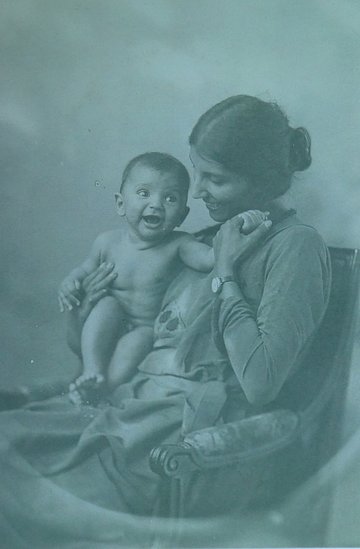
Dorothy Bonarjee
‐
Prize-winning poet educated in Wales
Other names
Dorf Bonarjee
Dorothy Noel Bonarjee
Place of birth
Date of arrival to Britain
Place of death
France
About
Dorothy Bonarjee was born into a Christian Indian family in 1894, in North India. The family moved to Dulwich, south London in 1904. Her father entered Lincoln's Inn and her mother became Honorary Secretary of the Indian Women's Education Association in London. In 1910 her parents returned to India while her younger brother N. B. Bonarjee joined Dulwich Preparatory School and the children were left in the care of a guardian. Dorothy then joined her elder brother, Bertie Kay, in attending the University of Wales in Aberystwyth.
At Aberystwyth University in 1914, when she was 19, 'Dorf' Bonarjee was awarded an oak chair for winning the Eisteddfod (the Welsh music and poetry competition) for a poem on Owain of Wales. It was rare to win the competition for a poem written in English (rather than Welsh) and she was both the first woman and the first non-European to win. She had been at Aberystwyth for two years and had been close to winning the competition the year before. Earlier, in March 1912, Bonarjee had won a prize in a children’s literary competition run by the magazine The Gentlewoman. This was for a fairy tale. She was also a regular contributor to The Welsh Outlook, with many poems published between 1914 and 1919, a member of Aberystwyth College Literary Society and part of a group responsible for the college journal The Dragon. Her poetry was praised by contemporaries such as Laurence Binyon.
Bonarjee passed exams in Greek and graduated in 1916 with a BA in French. She then attended University College, London where she became the first woman to gain an internal law degree from the Faculty of Laws in 1917 (as opposed to the external LLB).
Dorothy and her mother were involved in suffrage activism in Britain. They both attended meetings of the British Dominions Woman Suffrage Union (BDWSU) in 1917, alongside other Indian women like Sophia Duleep Singh. These meetings were organized by and for women from other members of the white ‘Commonwealth’ (Australia, New Zealand, Canada and South Africa) to meet and discuss common female suffrage struggles with British women. A series of ‘Indian teas’ were put on for Indian women which the Bonarjees attended. In 1919 she signed the Indian Women’s Franchise Address alongside her mother.
In 1921 Dorothy married a French artist, Paul Surtel (1893–1985). They had one son, Denis, who died in infancy, and a daughter, Claire Aruna Surtel. The couple divorced in 1936. Bonarjee lived in the south of France for the rest of her life, practising art. She died in 1983.
Bonarjee, Neil Bruniat, Under Two Masters (London: Oxford University Press, 1970)
Gupta, Mohini and Andrew Whitehead (eds) The Hindu Bard: The Poetry of Dorothy ‘Dorf’ Bonarjee (Aberystwyth: Honno Welsh Women’s Press, 2023)
Jenkins, Beth R., ‘Bonarjee, Dorothy Noel ('Dorf') (1894–1983)’, Dictionary of Welsh Biography (2020) [https://biography.wales/article/s12-BONA-NOE-1894]
Whitehead, Andrew, ‘Dorothy Bonarjee: Bard of Aberystwyth’, Planet 238 (2020), pp. 70–6
Dorothy Bonarjee Archive, National Library of Wales, Aberystwyth
Welsh Newspapers Online, National Library of Wales, Aberystwyth
Image credit
John Pether, CC BY-SA 4.0, via Wikimedia Commons
